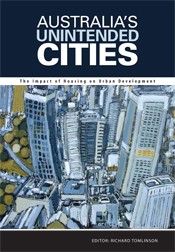Professor Richard Tomlinson, the University of Melbourne’s chair of urban planning, is the editor of a new book, Australia’s Unintended Cities: the Impact of Housing on Urban Development.
He believes state governments are unable to adopt a metropolitan perspective and the credibility of a strategic plan only extends to the next election.
Architecture & Design spoke to Tomlinson about urban planning problems in Australia, what can be changed and where we can look to for direction.
How does politics have an influence on design and urban planning?
The influence of politics is most obvious in the role of State planning ministers, strategic planning and the process through which local planning decisions can be taken to the minister. State governments prepare strategic plans for, and not with, the residents of cities. There is a participation process evident in the call for comments and meetings, but this always occurs in the context of the state government making the decisions. There is no ownership by the residents and their vulnerability to state politics is apparent when elections lead to a change in government and the development of a revised strategic plan. This is what we are presently seeing happen in Melbourne.
 Australia’s Unintended Cities: the Impact of Housing on Urban Development is available via the CSIRO.
Australia’s Unintended Cities: the Impact of Housing on Urban Development is available via the CSIRO.
Ultimately, there is an inherent contradiction with state planning for cities. Political parties court constituencies in order to win the next state elections and this involves planning to the benefit of key constituencies located in the city. This prevents a holistic, integrated perspective on a city. Then too, there are donors to political parties whose interest must be served. Disempowering local government planning decisions leads to a further politicisation of urban planning. When local development decisions are taken to the state level, state politics enters the picture.
The ability to impose decisions is not always a bad thing. There are occasions when city-shaping infrastructure investments do require tough decisions, but it would be far better if these decisions were taken by metropolitan bodies whose perspective on the future of the cities has been sanctioned by debate, disagreement and resolution among the residents of the metropolitan area.
What are some alternatives you think should be pursued?
The most obvious alternative concerns the location of power. Local development decisions are local. Metropolitan planning might override some local planning decisions, but this is far more acceptable and credible when the decisions are not calculated on the basis of accumulating votes to win state government.
Another issue that is seldom questioned is the assumption that if a service can be provided by the private sector then is should be; the assumption that the private sector does it better. This may be fundamentally wrong. For example, the public in Melbourne would be better served by an integrated transport system that allows profitable routes to cross-subsidise unprofitable routes and enable the extension of public transport services.
How do you think Australia's approach to affordable housing should be changed?
Well, Australia does not have a housing policy, let alone an affordable housing policy. The National Affordable Housing Agreement (NAHA) has been called Australia’s housing policy and there is a Commonwealth Housing Minister that oversees NAHA.
NAHA combines three housing programs, but there are other housing programs in addition to NAHA and these may be located in other ministries and outside the purview of the housing minister. This is certainly the case with the program that has the biggest budget and the greatest reach - the income supplement provided through the Commonwealth Rent Assistance program.
The Henry Tax Review identified a number of perverse tax incentives that have outcomes other than those intended, or may be incentives where no housing impacts were anticipated. Perhaps the most commonly mentioned perverse incentive arises as a result of negative gearing, where those having a house are subsidised by government when it comes to bidding against those without housing. One consequence is an increase in housing prices.
State government strategic plans invariably worsen matters since, while espousing metropolitan consolidation and higher density at transport nodes, their application does not prevent urban sprawl. When higher density development does occur closer in, it will often be randomly distributed in the metropolitan area and not located at transport nodes. So, taking into account that there is not a low-income housing policy and there is no housing sector policy, the question regarding affordable housing centres on money - money for those unable to enter the housing market comes from the Commonwealth government.
This means that the potential for increased affordable housing reflects Commonwealth political priorities. Of course, is possible to solve this problem. If Australia had a Bill of Rights that included housing as a right, then the Commonwealth government would be obliged to provide the necessary funding. You might argue that my solution to planning and housing decisions is to change the constitution and to change Gillard cabinet in order to locate housing programs and housing policy in one ministry, and to formulate a housing policy. This would help!
However, there are less ambitious ways forward. Without political intent, the Rudd government did seem to prioritise housing those unable to enter the market. Melbourne did have a Melbourne and Metropolitan Board of Works. The Queensland government has devolved some powers to a semi-metropolitan government. There are pointers.

